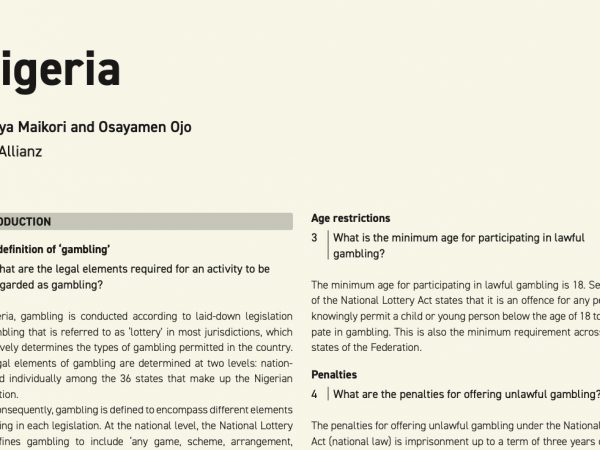
It is universally accepted, writes Yahaya Maikori, gaming lawyer at Lagos-based Law Allianz, that for any business to thrive in a foreign environment it will need the support of the locals. The problem for most operators, he says, is how to find a partner.
In spite of recent developments in America, the African gaming market still generates a lot of interest amongst European operators looking to expand beyond their shores. But in the mist of that palpable excitement is always the nagging question: “How do I go about finding my way around this populous continent?”
The reality is that most foreign operators have never had any kind of contact with Africa or Africans. Besides Africa is a continent of 52 countries, which is a large number of countries  to choose from. The diversity of its inhabitants, race, religions, cultures, business ethics, communication and jurisprudence give subtle nuances to how even international best practices are implemented in the respective markets. Getting these right will determine the success or other- wise of such companies in their chosen markets.
to choose from. The diversity of its inhabitants, race, religions, cultures, business ethics, communication and jurisprudence give subtle nuances to how even international best practices are implemented in the respective markets. Getting these right will determine the success or other- wise of such companies in their chosen markets.
During the early days of sports betting in Nigeria most of the South African companies that ventured into the market failed to make these adjustments and this led to their failure or early demise. Typically in South Africa, the sports betting model revolves around large stand alone retail halls. An attempt to replicate that exact model in Nigeria met with limited success; those who eventually became market leaders succeeded because they noted the peculiarities of the local market .So instead of setting up these large shops they built mid-sized shops and implemented a franchise /affiliate retail model which saw the affiliates set up smaller mini contact shops at their own cost – reducing the principal’s capital expenses and allowing the operator to focus its resources on providing software and support, advertisement and payouts. This model led to their quick expansion to all the nooks and crannies of the country.
It is universally accepted in the business world that for any business to thrive in a foreign environment it will need the support or the assistance of locals. The problem with most operators then is how to find a partner in their chosen market given the multitude of issues they must sieve through to arrive at a credible and reliable partner – and the multitude of variables and considerations it has to synthesize to arrive at a winning formula.
As a first step I always advise clients to secure the services of an industry professional to conduct thorough market research, which should take into cognizance peculiarities of the local market as ear- lier highlighted. Such a report if properly conducted will throw up several of the local issues the operator will have to contend with in the course of entering the intended market. The operator needs to juxtapose results of the research with its strength, weaknesses and objectives to reach some form of understanding of what kind of partnership is needed to drive its business.
By way of an example if the market research shows that the market is a grey market; an opera- tor which has decided to enter a given market may need to consider adding to its shopping list “a knowledgeable and respected industry practitioner” or alternatively “an influential person with strong government contacts” provided it also procures the services of a gaming lawyer or industry expert to handhold it as it navigates the unclear regulatory landscape.
In another scenario a client decided to partner with the owner of a media outfit in order to tap into the partner’s strong media entertainment industry contacts. In arriving at this decision, the operator noted that it was a very strong global brand, had adequate funding and could mobilize its global contacts to intervene in any local political issues. but prioritized that it needed to leverage on the entertainment industry to fur- ther localize and entrench its brand.
In a third situation, a foreign company which had strong online presence in Europe needed to tap into the retail market in order to access 93% percent of the local bet- ting market. It simply acquired a majority stake in a burgeoning local operation there by acquiring both a substantial size of the retail market as well as the team’s expertise and skills of the local market, then it went on to reconstitute the board to reflect its diversity and add other competences.
From the above examples it is important to note that no two operators are the same. Operators’ needs do not only differ from that of others but may need to be adapted or deployed to different markets which will bring about different results. Securing a local partner is never a science; at best it is a delicate art, which has its share of risks but taking these considerations can surely minimize the margin of error.
By way of caution no matter how pleasant and sophisticated a potential partner may appear to be, the operator needs to conduct thorough due diligence on the company, its directors and management to understand their business philosophy, ethical standards, accountability and their temperament from col- leagues, business associates, employees and suppliers.
Finally the roles, tasks, remuneration, targets of the prospective partner must be negotiated to the letter and documented; it will also help if further training in terms of international best practices, service delivery and dispute resolution is provided – this will bring about more clarity and reduce areas of potential conflict.

